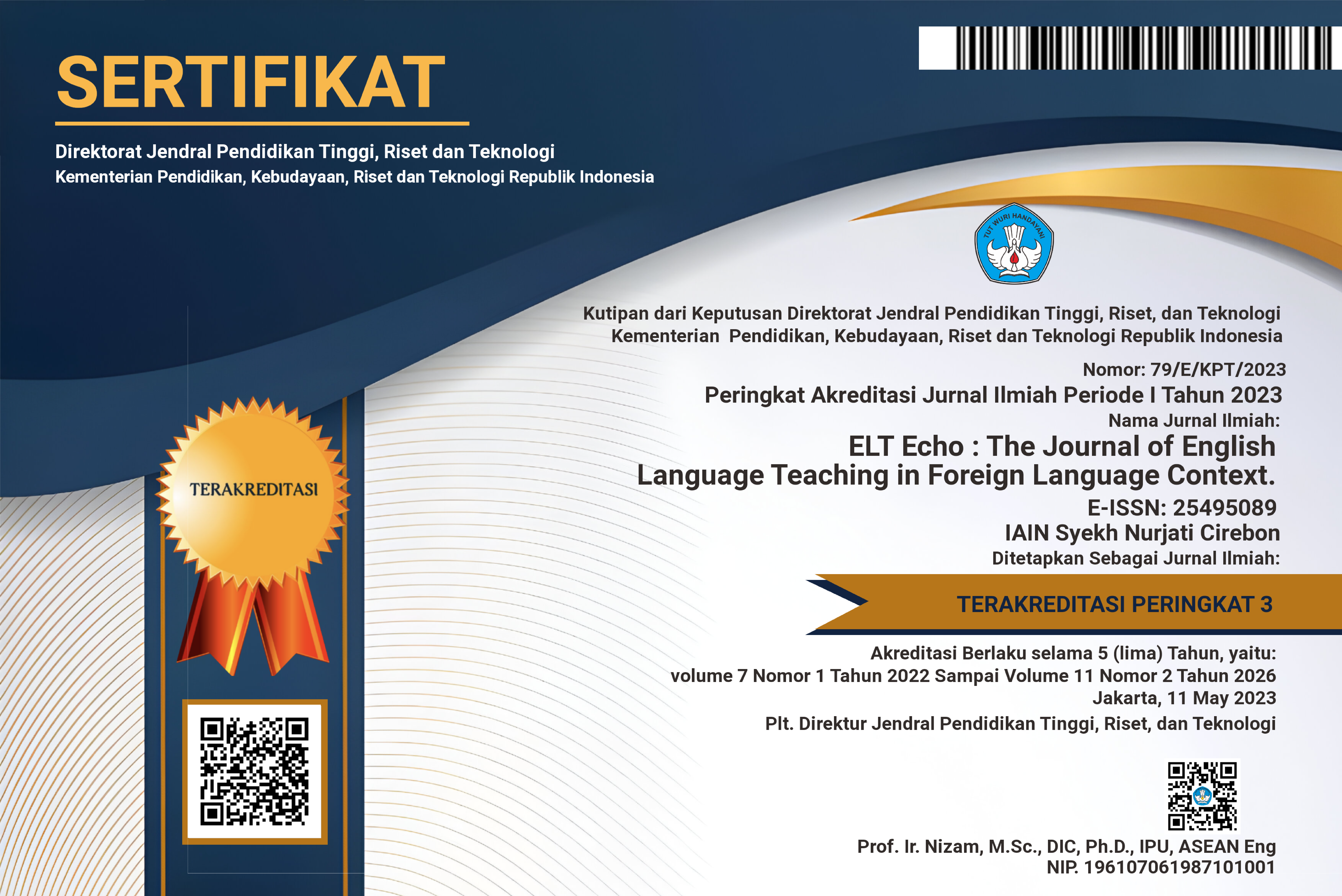BEYOND HYPOTHESIS: AN UNSTRUCTURED INTERVIEW ON STORYTELLING TRAINING
(1) State Polytechnic of Sambas
(2) State Polytechnic od Sambas
(*) Corresponding Author
Abstract
Community empowerment in the border area has attracted considerable attention, including in terms of English Language learning. This study is a smaller part of a bigger project carried out in Temajuk Village, West Kalimantan, Indonesia. This study used unstructured interviews to explore what has neither been tested in the hypothesis nor questioned in the research problems. The unstructured interview has not really been put to use despite its ability in uncovering a wider range of topics of conversation. Thus this descriptive study seeks to examine participants’ thoughts after attending a six-meeting training of storytelling in English to tour guides in Temajuk Tourism Village. The findings revealed that participants appreciated the training given and are enthusiastic about attending more training. The pocketbook surprisingly is the most favorable way of teaching preferred by participants. This study also encourages the use of gradually increasing difficulty of method in teaching English for participants coming from different backgrounds of educations and ages. This study provides insights and input for future policies and programs for the empowerment of the border community.
Keywords
Full Text:
PDFReferences
Alamsyah, A. (2016). The use of local short story in English language learning (A literary review on the use of local sources as an alternative teaching media in EFL). Konferensi Linguistik, Tahunan Atma Jaya, 286-290.
Amru. (2016). Storytelling to improve speaking skills. English education Journal (EEJ), 7(2), 194-205.
Astuti, E. Y., Sulisworo, D., & Wahyuningsih, T. (2017). Educational enhancement in the borders area to support the community development in West Kalimantan. 4thInternational Conference the Community Development in ASEA
Brata, N. T. (2020). Authority and budget for education services in the border area: Case study in Sebatik Island, North Kalimantan. Forum Ilmu Sosial, 47(1), 19-27. DOI: https://doi.org/10.15294/fis.v47i1.24269
Chaskin, R.J. (2001). Building Community Capacity, Walter de Gruyter, New York.
Coşkun, A. (2016). Benefits of Out-of-class Speaking Activities for EFL Students. Uluslararası Türkçe Edebiyat Kültür Eğitim Dergisi, 5(3), 1448-1464.
Foss, P., Carney, N., Mcdonald, K. & Rooks, M. (2007). Project-based learning
activities for short-term intensive English programs. Asian EFL Journal, 23, 1-19.
Hidayati, Y. (2019). The effect of storytelling towards students' speaking skill at X grade students of MA Nurul Haramain Boarding School. JOLLT Journal of Languages and Language Teaching, 7(2). 132-143.
Prasetyo, Y. E. (2017). From storytelling to social change: The power of story in the community building. Community Development Academy III.
Ryan, R. M., & Deci, E. L. (2017). Self-determination theory: Basic psychological needs in motivation, development, and wellness. The Guilford Press. https://doi.org/10.1521/978.14625/28806
Inayah, R. (2015). Improving students’ speaking skill through storytelling technique. Eltin Journal, 3(1), 25-37.
Muzammil, L. & Andy. (2017). Teaching proficiency through reading and storytelling (TPRS) as a technique to foster students’ speaking skill. JEELS, 4(1). 19-36.
Printer, L. (2021). Student perceptions on the motivational pull of teaching proficiency through reading and storytelling (TPRS): A self determination theory perspective. The Language Learning Journal, 49(3), 288-301.
Ramadhani, A. A. (2016). Enriching the English students’ speaking ability using recount story telling with guided questions at STKIP Muhammadiyah. Jurnal Perspektif, 1(2).96-102.
Royani, M. (2013). The use of local culture texts for enthusiastic English reading teaching. The International Journal of Social Sciences, 7(1), 130-135.
Santoso,T.N.B., , Siswandari , Sawiji,H.(2018). The effectiveness of ebook versus printed books in the rural schools in indonesia at the modern learning era. International Journal of Educational Research Review, 3(4),77-84
Songbatumis, A., M. (2017). Challenges in Teaching English Faced by English Teachers at MTsN Taliwang, Indonesia Journal of Foreign Language Teaching & Learning, 2 (2), 54-67.
Sudartni, S. (2012). Inserting local culture in English language teaching to promote character education. Jurnal Pendidikan Karakter, 2(1), 45-54.
Surya, I., Budiman, Syarifuddin, T. I., & Nurmiyati, N. (2021). Dampak desentralisasi terhadap pelayanan pendidikan di daerah perbatasan Kalimantan. Jurnal Agregasi, 9(1).
Sutaat. (2012). Social empowerment in border area; Study of problems, needs and Resources in Jagoi village, District Jagoi Babang, Municipality Bengkayang, West Kalimantan. Sosiokonsepsia, 17(1).
Tenore, M. (2017). Best practices for doing community-drivem storytelling. Amrican Press Institute. https://www.americanpressinstitute.org/publications/reports/best-practices-community-driven-storytelling/
Widyaningrum, W., Kamidjan, & Raharja, H. F. (2021). The effect of storytelling on the students’ speaking skill in subtheme 3, indonesian language competence for grade V at SDI Al-Washoya Ngoro Jombang. Jurnal IJPSE (Indonesia Journal of Primary Science Education), 1(2), 67-72.
Zhang, Y. , & Wildemuth, B. M. (2009). Unstructured interviews. In B. Wildemuth (Ed.), Applications of Social Research Methods to Questions in Information and Library Science (pp.222-231). Westport, CT: Libraries Unlimited
DOI: 10.24235/eltecho.v6i2.8991
Article Metrics
Abstract view : 73 timesPDF - 17 times
Refbacks
- There are currently no refbacks.
Â
This Journal is indexed by:
Â

This work is licensed under a Creative Commons Attribution 4.0 International License.










